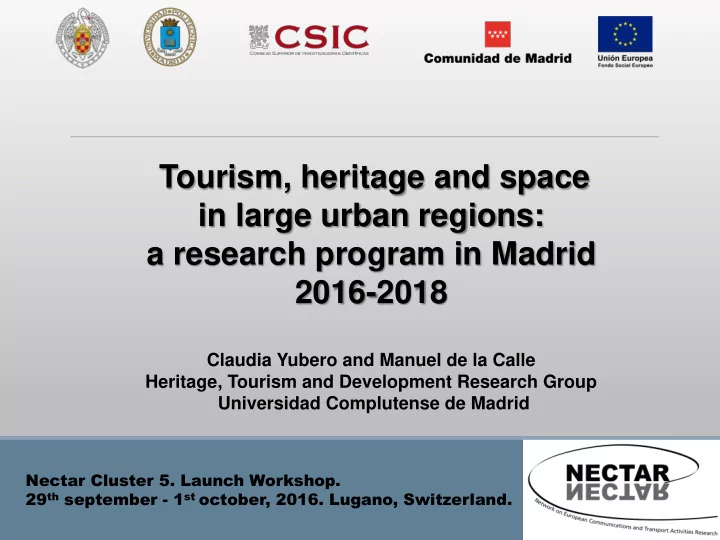

Tourism, heritage and space in large urban regions: a research program in Madrid 2016-2018 Claudia Yubero and Manuel de la Calle Heritage, Tourism and Development Research Group Universidad Complutense de Madrid Nectar Cluster 5. Launch Workshop. 29 th september - 1 st october, 2016. Lugano, Switzerland.
Who we are Since 1995 Heritage and tourism in historic cities Tourism functionality analysis and evaluations Tourism planning
Research projects & contracts Historic Monumental Cultural Archaeological cities sites landscapes areas
The Heritage Ensembles as Tourist Assets in the Community of Madrid: Problems and Opportunities in Territorial Perspective. Metropolitan tourism results from the link between traditional city tourism and a new metropolitan agglomeration tourism (Marchena, 1995).
Introduction to the program Institutional needs (!) Scientific needs Main objective: Understand whether (and where) the deployment of tourism&leisure corresponds to the distribution and promotion of cultural heritage.
The team Spanish Cultural Heritage Institute - IPCE Laboratoire d’urbanisme UPEC-UPEM- EIVP - París Regional Council Local Aranjuez Cultural Istituto Superiore per i Sistemi governments Landscape Foundation Territoriali per l'Innovazione - Turín Cultural Heritage associations Spanish R.G. (Castilla-la-Mancha University, Sevilla, Valladolid)
Background The Communit ity of f Madrid id is is o one of f the majo jor touri rist regio ions of f the country ry, sim imil ilar to other r la large European urb rban regio ions where capit itals ls settle le (P (Paris is, Lis isbon, Rome, Berl rlin in, etc.) .) 6.5 million inhabitants >4.55 million foreign tourists 13.67 million trips 9.12 million national tourists Data source: IET. 2.67 million residents Madrid: 19,75 Île de France: 77.69 | Inner London: 44.82 | Lazio: 30.68 | Berlin: 26.8 | MA Lisbon: 11.94 Overnightsatys (million)- Data source: Eurostat.
Background The regio ional l map explo lored to date fi fits the d dis istri ributio ion model l sugg ggested by Hall ll (2 (2005; 2009). ). How does the touri rist deplo loyment lo look li like? Dis istri ributio ion of f touri rist mobil ilit ity. Dis istri ributio ion of f the t touri rism in infr frastructure.
Distribution of tourist mobility Inside the Madrid region: Foreign National Resident visitors visitors visitors One day trippers Methodological limitations . Secondary housing -2 Official household mobility surveys -1 Official Tourism survey -2 telephonic surveys Overnight in -Information requests in TIO in 3 cities. comercial facilities
Distribution of tourist mobility Alternative data sources are emerging… Photosharing + GIS Source: García, Gutiérrez & Mínguez, 2015. Identification of tourist hot spots based on social networks. Applied Geography , 63, 408-417.
Distribution of tourist mobility Alternative data sources are emerging… Tracksharing + GIS
Distribution of the tourism infrastructure Restaurants, Accomodatio ion, & Secondary ry housin ing 162.022 second homes 30.000 restaurants 142.154 beds Tourist power and tourist especialization
Distribution of the tourism infrastructure Emerging phenomena in tourism with significant spatial impact on cities… Madrid (Inside AirBnB) 4,580 ( 61.5% ) entire home/apartments 2,760 ( 37.1% ) private rooms 106 ( 1.4% ) shared room
Background Our r communit ity has a a very ry powerful l and div iverse heri ritage, a le legacy la largely associa iated wit ith t the s status o of f Madri rid as the p poli litic ical l and admin inis istrativ ive header from the Modern Age., but… Cultural motivation vs. Cultural practices
Background Heri ritage is is r requir ired to act as a a reference of f regio ional l id identit ity, to supply ly a quali lity envir ironment for the resid ident popula latio ion and als lso to become an economic ic resource via ia touri rist use for r the regio ional l develo lopment.
Scientific Programme O.2. HERITAGE INFORMATION SYSTEM IN GIS AND IMPLEMENTATION OF TOURIST APPLICATIONS (SIPCAM). 1. To define heritage ensembles (density, spatiality & interest) 2. To define regional structure 9.140 elements Law 3/2013, of 18 th June, of Historical Heritage of the Community of Madrid R2-1 Tourist information system based R2-2 Virtual Atlas of on GIS: SIPCAM heritage ensembles
Scientific Programme O.4. CHARACTERIZING AND EVALUATING THE TOURIST USE OF REGIONAL HERITAGE ENSEMBLES. REGIONAL SCALE R4-1 Intensity tourist use map focusing on heritage ensembles. LOCAL SCALE R4-2 Case studies in selected heritage ensembles. ?
Activity Programme ** Throughout the year specific courses ** 1. Geospatial analysis in Tourism using BIG-Data. 2016/2017. 2. Space Syntax: tourism patterns in urban spaces. 3. Use of geomarketing and geotourism applications.
Thank you for your attention Contact details: Claudia Yubero claudiayubero@ucm.es www.ucm.es/patrimonioturismomadrid
Recommend
More recommend